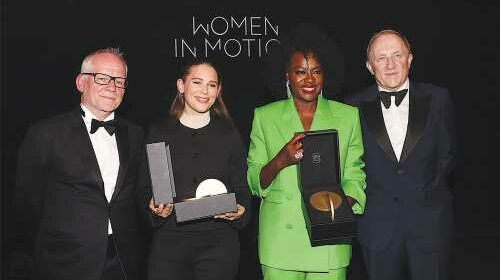Kering’s Women in Motion Program to Celebrate Michelle Yeoh and Female Filmmakers at Cannes

Substantial change doesn’t take place instantaneously, whether it’s designing a feature film, or even editing one. And, when it comes to women’s roles in the arts, the crucial journey may be longer than one may wish.
Aiming to facilitate change is Kering’s Women in Motion program, which launched in 2015. While its initial goal was to promote women in cinema, it has since expanded to include multiple art forms, with photography, music and choreography among them. Just a few of their many initiatives include artist recognition with monetary rewards, talks and podcasts. They provide support in word, as well as deed, with actions reminiscent of Gloria Steinem’s talking circles at times.
“We are actually creating a kind of community of female artists who, all around the globe, can recognize themselves as ‘Women in Motion,’ ” says Valerie Duport, Kering chief communications and image officer. “We love that all this is also about sorority.”
Citizenship in a specific country isn’t a prerequisite for the group’s financial endorsement. Spanish director Carla Simón won the program’s Emerging Talent Award in 2018 following the debut of her first feature film, “Summer 1993.”
Bolstered with fiscal support from the award, she made her second film, “Alcarràs,” which went on to win the top prize at the Berlin International Film Festival in 2022. It’s the only project ever to earn recognition of this magnitude in the local Catalan language. Equally as impressive, none of the people that Simón directed in the film were professional actors before securing their roles.
At the festival, Kering will honor another female pioneer, Michelle Yeoh, with the Women in Motion Award. Yeoh made history earlier this year by winning the best actress Oscar for her starring role in best picture winner “Everything Everywhere All at Once.” Yeoh is the first Asian woman to win in this category.
Yeoh will receive her award during the Women in Motion dinner, a glamourous and celebratory event at Cannes that’s dedicated to honoring female filmmakers, actors and producers. Yeoh was chosen by François-Henri Pinault, chairman and CEO of Kering, and Iris Knobloch, the new president of the Cannes Film Festival, as well Thierry Frémaux, Cannes Festival’s director.
Despite the success of a filmmaker like Simón, progress sometimes is not that obvious. “The impression of change, for one, can be a trap,” Duport notes, “so you always have to look at facts in their nuance and complexity to continue the work consistently in the long run.”
Tangible accomplishments include six women directors out of 19 in contention for the Cannes Film Festival’s Palme d’Or. In the festival’s 75 editions, only two women have won the Palme d’Or: Jane Campion for “The Piano” in 1993 and Julia Ducournau for “Titane” in 2021.
While it seems like an achievement — Cannes did include five female directors in its 2022 competition lineup — it’s also a bit startling that it has taken this long for women to see their work represented at the same levels as their male counterparts.
“We’re very much aware that societal mindsets are so deeply rooted it takes several decades to make progress, that this is a journey,” explains Duport, “which is why Women in Motion has always been seen as a long-term endeavor.”
Further putting the framework of women directors into context, in 2021’s top 100 films based on box office alone, only 12% were directed by women. But, in the years from 2006-2021, the percentage was down to 5.4% of 1,542. Numbers are low, and while it can seem discouraging, progress comes incrementally.
Remaining aware of the ultimate goal and what it takes to get there is key. Says Duport: “We are convinced that it is by giving maximum visibility to artists and professionals in [these] fields … we will trigger change.”
Read More About:
Source: Read Full Article